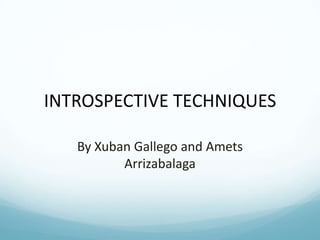Introspective techniques
•Transferir como PPTX, PDF•
4 gostaram•6,177 visualizações
Denunciar
Compartilhar
Denunciar
Compartilhar

Recomendados
Recomendados
Mais conteúdo relacionado
Mais procurados
Mais procurados (20)
Approach, Method, Procedure & Technique in language Teaching

Approach, Method, Procedure & Technique in language Teaching
The irf interaction pattern in classroom observation

The irf interaction pattern in classroom observation
Semelhante a Introspective techniques
Semelhante a Introspective techniques (20)
Information Processing and Cognitive Theories of Learning

Information Processing and Cognitive Theories of Learning
Introspection - Introspective Method in Research Methodology

Introspection - Introspective Method in Research Methodology
Declarative, Procedural, and Funtional Knowledge (BATLAG & BADONIO).pptx

Declarative, Procedural, and Funtional Knowledge (BATLAG & BADONIO).pptx
Último
Último (20)
Basic Civil Engineering first year Notes- Chapter 4 Building.pptx

Basic Civil Engineering first year Notes- Chapter 4 Building.pptx
UGC NET Paper 1 Mathematical Reasoning & Aptitude.pdf

UGC NET Paper 1 Mathematical Reasoning & Aptitude.pdf
Salient Features of India constitution especially power and functions

Salient Features of India constitution especially power and functions
General Principles of Intellectual Property: Concepts of Intellectual Proper...

General Principles of Intellectual Property: Concepts of Intellectual Proper...
Unit-V; Pricing (Pharma Marketing Management).pptx

Unit-V; Pricing (Pharma Marketing Management).pptx
Sensory_Experience_and_Emotional_Resonance_in_Gabriel_Okaras_The_Piano_and_Th...

Sensory_Experience_and_Emotional_Resonance_in_Gabriel_Okaras_The_Piano_and_Th...
Interdisciplinary_Insights_Data_Collection_Methods.pptx

Interdisciplinary_Insights_Data_Collection_Methods.pptx
Unit 3 Emotional Intelligence and Spiritual Intelligence.pdf

Unit 3 Emotional Intelligence and Spiritual Intelligence.pdf
Introspective techniques
- 1. INTROSPECTIVE TECHNIQUES By Xuban Gallego and Amets Arrizabalaga
- 2. INTROSPECTION: Introspection is the process of observing and reflecting on one´s thoughts, feelings, motives, reasoning process and states determine our behaviour. Nunan (1992)
- 3. VERBAL REPORTS AND DIARY NOTES
- 4. VERBAL REPORTS Information currently available in short-term memory. There are kinds of verbal reports, differentiated by when the data is collected. •A think aloud •Retrospective report
- 5. HOW TO COLLECT DATA? • MAIN PROCEDURES TO CONDUCT VERBAL REPORTS • SOME PROCEDURES TO ORGANIZING AND INTERPRETING DATA
- 6. MAIN PROCEDURES TO CONDUCT VERBAL REPORTS - GIVE SIMPLE DIRECTIONS - BE AS UNOBTRUSIVE AS POSSIBLE - ASK IN PARTICULAR POINTS - RECORD THE SESSION:
- 7. ORGANIZING AND INTERPRETING DATA 1. First, transcribe your data. 2. Review existing studies on language learning 3. Divide your data of what respondents said into thought units 4. Sort each thought unit into one of the categories 5. Have a second reader also code the data 6. Look for patterns in your categorization
- 9. WHAT ARE DIARY STUDIES? 1. Bailey and ochsner (1983) 2. Bailey (1991)
- 10. WHY USE DIARY STUDIES APPLIED IN LINGUISTICS REASEARCH? 1.- Can provide information 2.- Allow researchers to see factors identified by teachers and learners 3.- Vehicle of data triangulation 4.- “Low-tech”, portable and trainable
- 11. COLLECTING DIARY STUDY DATA 1.- Affective and instructional factors that affect L2 learning and teaching 2.-personal language learning or teaching history, details, feelings... 3.-look for patterns and significant events. 4.-Final report
- 12. ORGANIZING AND INTERPRETING DATA 1.- The content or what is said 2.-The context or where it is set. 3.-The form or how it is said
- 13. ORGANIZING AND INTERPRETING DATA According to Pavlenko (2007) It is important in looking at narrative data to “consider not only what was said or written but also what was omitted and why” (p.274)
- 14. ORGANIZING AND INTERPRETING DATA The context of the diary entries, on a macro and micro level (Pavlenko, 2007).
- 15. ORGANIZING AND INTERPRETING DATA Form: structure, formal lexical items, target language, first language
- 16. PRESENTING THE FINDINGS Many learners and teachers do keep a diary, but they frequently feel that this data is not appropriate for a serious study.
- 17. BIBLIOGRAPHY -Sandra Lee McKay, Introspective Techniques -What is introspection? http://www.wisegeek.com/what-is-introspection.htm -Diary study guide: http://www.webcredible.co.uk/user-friendly-resources/ webusability/diary-study-guide.shtml